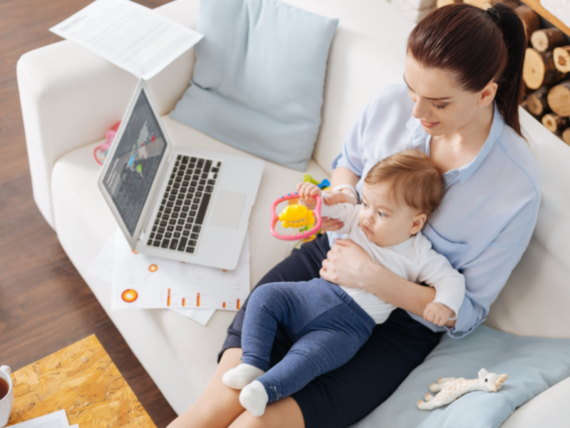Before your new baby comes, you’re bound to be thinking of all the ways you’ll spend your parenting leave. Most of us envision having time to organize every closet in the house, finally painting the garage, or idyllic afternoons reading in the park, baby napping peacefully on a blanket you crocheted yourself. Oh, the free time you’ll have! And while we certainly hope some of this comes true, we also know that the reality is a bit… busier. Overall, your parenting leave is bound to be an enjoyable time to bond with the new family member, but it is also a great time to get some things organized, like your banking and finances.
You’re likely spending a lot of time sitting for feedings and lap naps and that time is built for daydreaming – and that’s a good thing! You’re bound to be considering how the next few months and years can look for your new family. Now, with mom, dad — or possibly both — at home for a few weeks or months, this can be a great opportunity to do a financial mini-audit. Don’t be scared off by the word audit, because taking a look at how things are working — and how they’re not — is very empowering. Remember: it doesn’t have to be scary.
You can start small and dig deeper when you have the mental bandwidth, but the important thing here is just to be honest with yourself about your family finances and how they can improve. Small changes will make a difference and a financial review will never be easier than it is today, especially with all the tools available to you online. We’ve got five easy ways to get you started but keep rolling if you have the time and energy when you’ve completed these.
Make yourself look at it in print on paper. Yes, on paper.

Print out three months (or more) of your banking statements and arm yourself with some coloured highlighters. Something about holding paper and reading from a page makes it stick, so really try to do this in a tangible “pen and ink” way if you possibly can. Highlight in separate colours things like utility bill payments, rent and mortgage, takeout food and beverages, social activities, groceries, clothing, etc. This is a judgement free zone and we’re not going to tell you to start making cuts, but rather just to be aware of where your money is going. This is the first step to acknowledging how you spend your money — and that’s great!
Check your subscriptions and ask yourself some questions.

Do you still need 12 streaming services you forgot to unsubscribe from after the free trial period ended? Are you still enjoying the food box deliveries you get? If yes, keep them. (We’re not here to make your life harder!) We repeat: if these things are adding to the enjoyment of your time off, and the payment for each does not cause stress, keep them. But be honest with yourself and if they are just one more thing you pay for and don’t use, get rid of them! Hit that “unsub” button and get that money back into your accounts where it can add up for you. Even $25 a month saved in deleting apps and services you never use adds up to $300 a year!
Start an emergency fund.
Open a new chequing account to use for a dedicated purpose of housing your $1000 short term emergency fund. Short term emergency funds can cover unexpected mini crisis like flat tires, leaky roofs, or irreparable appliances (because no new parent should have to live without access to a washing machine or dryer). You may want to consider opening an additional account, too – and it can become the account you use for secure savings for annual family vacations, or larger purchases. Having a specific chequing account for these reasons keeps you from turning to credit cards for emergency purposes and will save you money – and headache – in the long run. When you use funds from your account, work to build it back up again so you maintain the $1000 float.
Be good to yourself. You deserve it.
Sometimes a break is called for, and you should never feel bad about indulging when it’s something that is going to help you get through the day. It doesn’t need to break the bank to be effective, either. In fact, when a day is going sideways and it’s only 10:30am, make the call to order dinner in and save yourself the stress of that decision later. It’s likely going to cost less than $50, and the payoff is going to be worth it when you aren’t dealing with dishes and a messy kitchen on top of a chaotic bedtime.
Taking this time while you’re at home falling in love with baby to make plans for a secure financial future shouldn’t feel like pressure. The small tips above are a great way to get started in a stress-free way and can be done all at once or over the weeks you’re home. You don’t need to be a financial wizard, immersing yourself in the latest trends on investment in order to get a good handle on your finances — you just need to have a good, solid bank and people you trust, and you need to be active in your plan. The good news is that this is all easy to acquire and there’s a great chance that the starting place is likely right around the corner (often literally.) Take time to rest up and get a good financial footing while baby is new, because you have a lot of excitement and fun ahead of you with your new family. When you start to figure this stuff out early in your parenting career, it saves time and energy when you’ll need it most: the toddler years.
*Opinions expressed are those of the author, and not necessarily those of Parent Life Network or their partners.




 Sponsored
Sponsored



